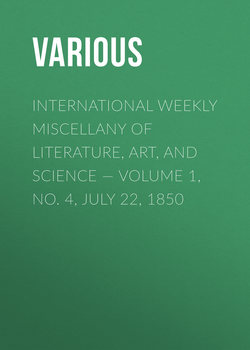Читать книгу International Weekly Miscellany of Literature, Art, and Science — Volume 1, No. 4, July 22, 1850 - Various - Страница 2
LITERARY COTERIES IN PARIS IN THE LAST CENTURY THE ATHENÆUM UPON HAWTHORNE. 2
ОглавлениеThe London Athenæum, of the 15th June, has the following remarks upon the last work of NATHANIEL HAWTHORNE:
"This is a most powerful and painful story. Mr. Hawthorne must be well known to our readers as a favorite of the Athenæum. We rate him as among the most original and peculiar writers of American fiction. There in his works a mixture of Puritan reserve and wild imagination, of passion and description, of the allegorical and the real, which some will fail to understand, and which others will positively reject,—but which, to ourselves, is fascinating, and which entitles him to be placed on a level with Brockden Brown and the author of 'Rip Van Winkle.' 'The Scarlet Letter' will increase his reputation with all who do not shrink from the invention of the tale; but this, as we have said, is more than ordinarily painful. When we have announced that the three characters are a guilty wife, openly punished for her guilt,—her tempter, whom she refuses to unmask, and who during the entire story carries a fair front and an unblemished name among his congregation,—and her husband, who, returning from a long absence at the moment of her sentence, sits himself down betwixt the two in the midst of a small and severe community to work out his slow vengeance on both under the pretext of magnanimous forgiveness,—when we have explained that 'The Scarlet Letter' is the badge of Hester Prynne's shame, we ought to add that we recollect no tale dealing with crime so sad and revenge so subtly diabolical, that is at the same time so clear of fever and of prurient excitement. The misery of the woman is as present in every page as the heading which in the title of the romance symbolizes her punishment. Her terrors concerning her strange elvish child present retribution in a form which is new and natural:—her slow and painful purification through repentance is crowned by no perfect happiness, such as awaits the decline of those who have no dark and bitter past to remember. Then, the gradual corrosion of heart of Dimmesdale, the faithless priest, under the insidious care of the husband, (whose relationship to Hester is a secret known only to themselves,) is appalling; and his final confession and expiation are merely a relief, not a reconciliation. We are by no means satisfied that passions and tragedies like these are the legitimate subjects for fiction: we are satisfied that novels such as 'Adam Blair,' and plays such as 'The Stranger,' maybe justly charged with attracting more persons than they warn by their excitement. But if Sin and Sorrow in their most fearful forms are to be presented in any work of art, they have rarely been treated with a loftier severity, purity, and sympathy than in Mr. Hawthorne's 'Scarlet Letter.' The touch of the fantastic befitting a period of society in which ignorant and excitable human creatures conceived each other and themselves to be under the direct 'rule and governance' of the Wicked One, is most skillfully administered. The supernatural here never becomes grossly palpable:—the thrill is all the deeper for its action being indefinite, and its source vague and distant."
The Emperor Nicholas has just published an ordonnance, which regulates the pensions to which Russian and foreign actors at the imperial theaters at St. Petersburgh shall be entitled. This ordonnance divides the actors (national as well as foreign) into four classes. The first class obtains, after twenty years' service, pensions averaging from 300 to 1140 silver rubles. The others, after fifteen years' service, will receive pensions from 285 to 750 silver rubles.
